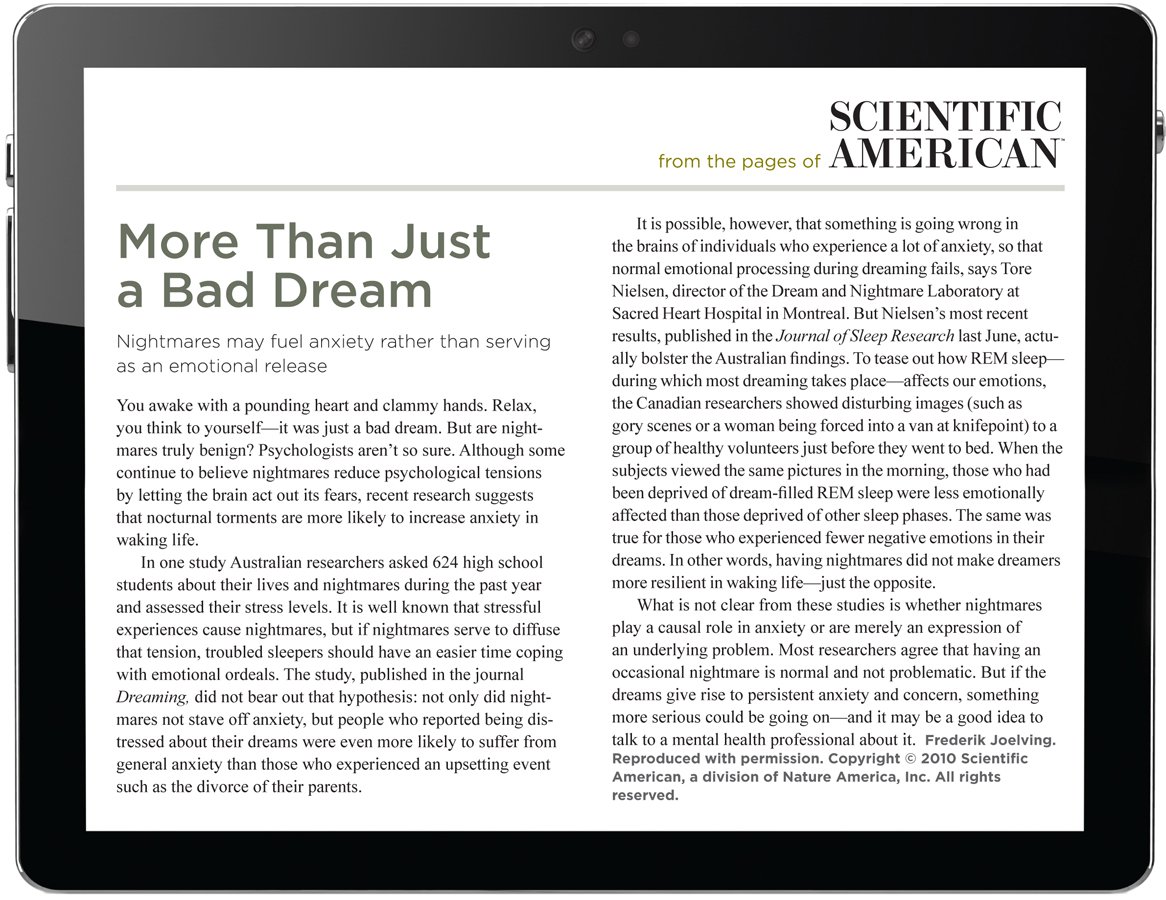Chapter 1. Chapter
Article
From the Pages of Scientific American
More Than Just a Bad Dream

Click the image to enlarge. Click "Next" to continue.
1.1 Quiz
Question
SNlvAZKd5oWGGm1Vkd1YYC/uqzcmkKLjZe2oiUWd9fpYnFhNcqWGMgjxfg0ZaauJPSwSTF4FXpjPMb8hBl+dFhE0ZkfQEt2Fjq+SyytE7/qwCLPVw/BlEbMfSV+2TpYe14i2cNyCoO8bPiTA+R3IuCAgSmhLit+X6fNrZ3i/1eLqcxXjYmWQMSU366OaAnCgJKZI/Xa9wMNKMKQsCorrect.
Incorrect.
Question
Br3L+hgf8Eln81fImmjxOk0v9NtM7gmYDVzZ5Iy88G5SxqfM/JgETgpr6Y9pdfDYaVUoOoelFIN7xb5jVMDIXbGxr8jmiih3QegaIj8UY69qr1347z25FkU7WHUlH0dz0kAO7kaxCHK2NF5jHY7fuA3p2Io9LMhf3xxby63074u2n0C0EzNDt6hZkjUrmtmmqxAY+VCM0esFaGpLqtI8qKAJA9k3GENvMvPF0kN91NPmVnROvlj86Pba0HtUGXwA73j+LQ/vUhO0lR39lu79J5alCWPz7G/NimyS5+TldgZGaoHfyj8e0HxyCWR+lO0YHtXGryUnj0ktIor1h/A52Mf9Cdl0xhzLVmpQE499Dq/1O0Ut/mGUzsSwqxlNkueYjwflX42OcmEvQj6zw8D7ALdFCDMHfvTgkMyReLC8OwFUqLxmdy8L5oKX715HGWHF1lBgUqdDAPeYOQhtt1b53/z03dnCMRhSMWtQ+SIt5pO5a6vvDH/to08w9nHlFaShhT2VLmmMb/tzF/mc76KcaPHj5zBkc0JWcBNqELigzLDkkv79SxDfiT+uIbNk2vBM+dfJS9R/Em3amVngxqRvs1LEgBHDLZL1G73T7RjDfBjlo+NI2PmQP5CNrVX68k4ErIlxuCYgCFnZlntYZ6LzZ+yEjpr0XbPElsV7ovOuwuo=Correct.
Incorrect.
Question
ZxWSuQ4bIvBYhF6JH++WW7YDkEJX6g0xJSNWcJ936QihFjt0p7Ggw8Dlhm4AlClgBmuWtvi5NlEG949XTtC0Nzy4PziwjA/JfqRuXP7w/RaIEs2MlGKayhz9O3YPUxZ1iS4+uzg1WyiG1pfPXC0fOxysFL58loWWQedjvPvgI04Np/OwJBXOOD6kVKEh+HJ1OTn7GAiNDvbLxTo9uYKCE3urbJlzCfxGHeiu46IB956Z7p5tX1tjEhP9TLet5EjqTuAUcDZEGOtdpL+H/S73V7bnEm/vzDKzny98r3TndQdrNRu3HrWDbIGysZ28JwQ2a23OA7mcfxFbceabsc8l8fZjnuIeEorD2a9TsaPocL7XDUw0Q5Aq84wTlRKtPSs9ZGqb3Pll+kWwfpXgKZ14fOsTmMnrq9iiMHJFqD4lS6mhYF1cLhT9p1aqE9SDtOU+MIM5gyrhsCCTLgykl+ATca6Mx4rfpOi8po4oDY0558I1dymC4qaemMIPd3J+Zh67SzNAugw4lbnSxQUTjPGdjvtS1oT5SWTc3LkQsCi1DyxK8KIVFyEbHNdTBFNcaBT1mSopesPqu0C3eU0owwJftPflvUtwcjS6u3h3k8LVOak5uUcP3+v5PcsZRJLy/MM4Correct.
Incorrect.
Question
kQGm2bOvGlM+F316TWW0PqVUsYhhUO0XJENeD7UNguW9jtpgZ267+GU1Wevsk1e891Szdj34PMQlPc5Ci91fZCzfhhfj/QnSPc2xkTnyuvgJk2APLd5XaGGgnxmWx+zmCKccxjzZqYh3RYLQCoiIP4HuYIZoBZWUssvkrQ+03CyFUDZjWIR5NJqn4c+BGtq9Waq6GHbjnex3CetbCY51bO/9h2D+GYtrWXdtbhqDihfaqfvc8xGcvjiRzePuEL4Y7nYy0CQN1eBMK3ngcxNtWBsupaLOdXEs6Ff0xchLPhD6+82tRfx0gZZBJPFJE8DETxZkbL5iAtTgWWKx2K64GtW7uDaZW7nAV2WJw/w+JCCF07cq6oj+4kHkXkIwUO08KF5Uey+0BsCbo8GOALF9TUasZVpnM3V4duDI6oM32On3wp5bjNnn8Q==Correct.
Incorrect.
Question
yHJoh2AC+yLuvgGzSmYbLg20CDvBGgagpdzmxtc1k+y3XXmBmL1+W+DseknOrv35I8UFdFYEJU1iyu/brc9MpypSHuWg/fKeYP40Vb/TZcMWpYWoKOmoW934ETD5HaA0+RDs2t0RcZ537j0j8pPQWDE/MFk4gjKlr22hzlmyoGWlcK66gS/guUYtfcUNfX4LBqOxqS6XjRLKFoiIKIzkfRkgXrCzNqgFr8HMHJYt+4B9Ij3jV1LHy7ZOQKKu38sTLPDOvCMLkAFhE7nfj4Fijcc1+j//guQ7Rsawglmia6wQUFWWd7zWgfKEBdExgPbJgN7m6u2awwAKeU+0OSdCK0ySCTV+tnEFcYnREU30TVO/fQMgGpURsZBVim4KPuJND7LWR8D5mp/Uft16EfXH6yix+Et/UFdmAeNiQdOSwdbjGU4u8yO7+ukeCzxJE7jD3JA//OE7aO1ayV7+7IAl6fkRql+d/oHX4cG8N7Kn6tUUoFQYqfmWWaaY9dI46ZTvrXTqCoPG9JdnLbVZ0hvXZujkoxDIbKSvwuGGwhMbZL2q0HLB04ITW5JW1dQ7+JIa++MJvTzbA3rb6ln1Correct.
Incorrect.